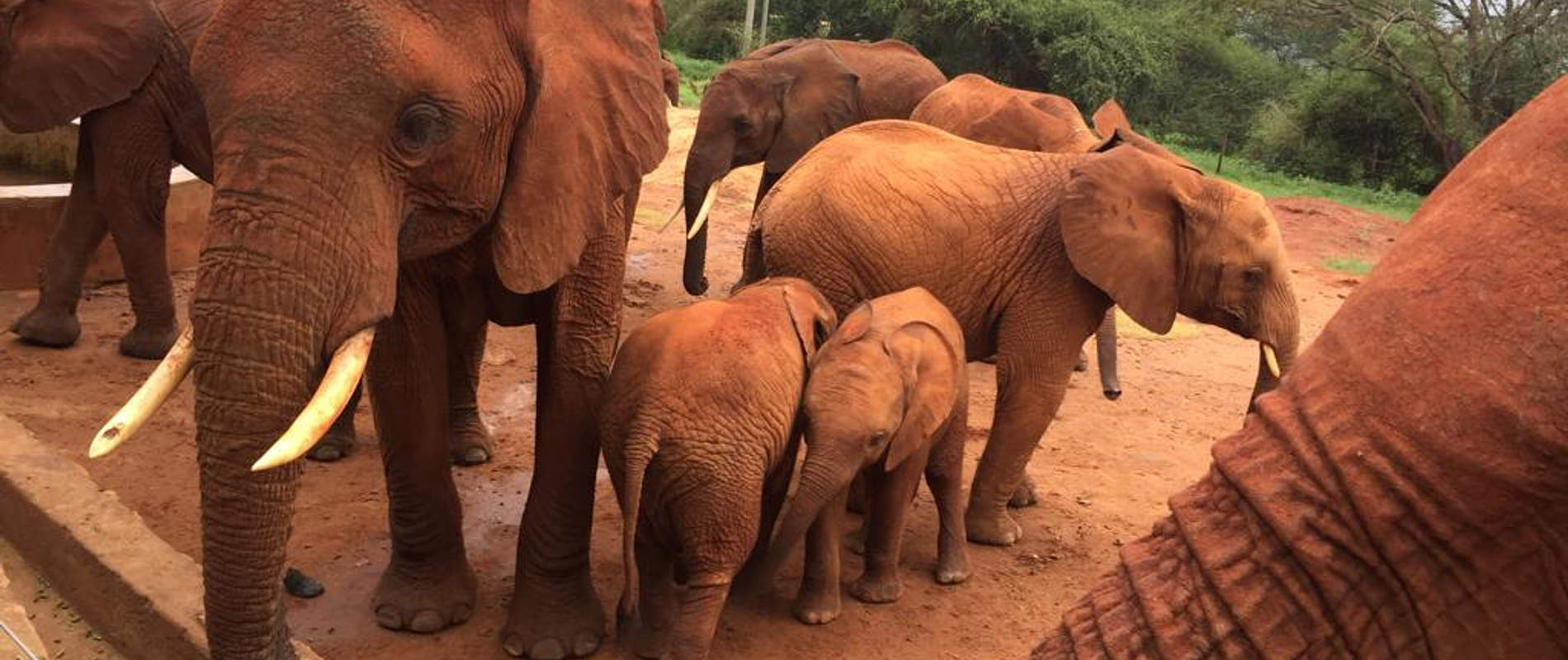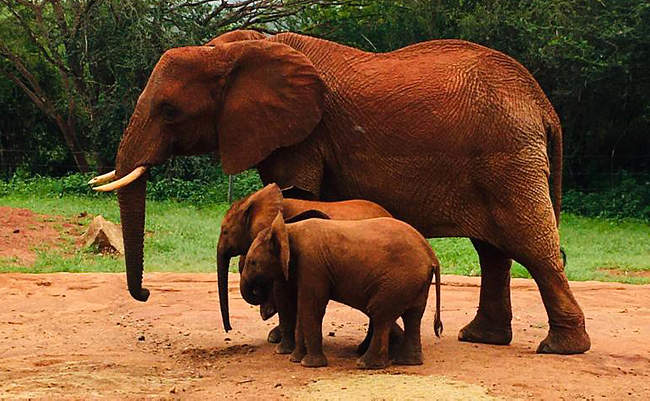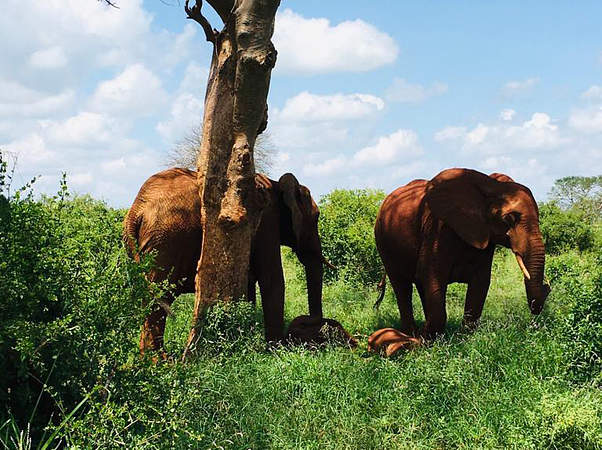Every day among elephants is special, but every so often, we have a truly momentous day — one that will remain imprinted on our hearts and in our minds forever. Today falls firmly into that category, as we celebrated the births of not one, not two, but three tiny miracles. These calves are the offspring of wild-living orphans who we raised from infancy, elephants who didn’t know their own mothers but nevertheless survived and thrived and eventually reclaimed their place in Tsavo. Please join us in welcoming a very special trio to the SWT family: Mwitu, born to first-time mum Mweya; Wema, born to second-time mum Wendi; and Eco, born to third-time mum Edie .
The celebrations began at our Voi Reintegration Unit, when Edie and Mweya arrived at the mud bath on the 17th November after an absence since the beginning of the year. They weren’t alone however, each girl had a tiny baby in tow. This is a moment we’ve been waiting for with much anticipation. When the Voi Keepers last saw Mweya and Edie, back in January, both were heavily pregnant. Then the dry season set in, a time when the wild-living orphans travel far and wide in search of good browse. After the rains arrived early, the Keepers wondered when they would reappear with their tiny babies tottering behind them. Their hopes were answered today.

Edie and Mweya’s calves look to be about three and four months old, which means they were born at the height of the dry season around July and August, and at a time when travelling back from their dry season ranges to introduce their babies would be impossible due to lack of water en route and the brutal conditions. Both babies are perfectly plump and in excellent condition, besides being a little tired after their long trek — one that we know is well over a hundred kilometers — back to Voi. After making their grand appearance at the waterhole below the Voi stockade the babies settled under a tree for a much needed nap, while their mums stood protectively nearby. The quartet showed up without the rest of their usual coterie, but we feel sure that the others will arrive soon. As is so often the case with new mothers, Edie and Mweya were probably so excited to introduce their babies to the Keepers who raised them that they forged ahead of the group, not wanting to waste a moment. The morning of the 18th, once the babies were well rested from the long journey, the two mothers were ready to introduce their offspring to the orphans and were at the Voi stockades early in the morning. Their arrival caused great excitement amidst the dependent orphans who got to interact with the little ones, before they all left together for the day, browsing as one big happy family.
We have named Mweya’s female calf, Mwitu, which means “wild” in Swahili. This feels a most fitting name to give Mweya’s first-born baby, given her unique journey from orphan to wild-living elephant. Mweya is an expat; she was rescued in Uganda in 2001, after she wandered into a fishing village as a one-month-old. While we navigated the bureaucracy of getting an elephant across a territorial boundary, she was held at the Uganda Education Centre, where she shared a space with several chimpanzees and quickly became the tiny ringleader of the group. She’s now 18 years old, and we know that her forceful personality will serve her well as a mum to little Mwitu.
Eco, as we’ve named him, is Edie’s third calf. We’re sure that her daughters, Ella (born 2009) and Eden (born 2015), have been extremely helpful nannies to Eco since his birth, and feel confident that they will reappear with the rest of the group in the coming days. Edie has come so far in the 20 years we’ve known her. She was rescued from the bottom of a well in April 1999, after her family struggled in vain to free her. The ordeal left her bruised physically and psychologically and, for many weeks, she suffered a deep depression from being abandoned. Seeing her now, a successful mother three times over, is one of our proudest moments.
Meanwhile, our Ithumba Reintegration Unit had its own milestone to celebrate. Around midday, again on the 17th November, Wendi strolled up to the mud bath with a newborn baby in tow. This is exactly what she did four years ago, when she gave birth to Wiva — and we’re happy to report that Wiva, who has been absent for a month, was part of today’s welcoming committee. Wendi was very eager to show off her tiny bundle of joy to Ithumba Head Keeper Benjamin and the rest of her SWT family, parading her around and even permitting some of the dependent orphans to interact with her. Wiva played the perfect older sister, following her around like a little shadow, and Wendi’s dear friend Naserian has clearly appointed herself the nanny-in-charge.
Wema means “goodness” in Swahili, and looking at Wendi’s angelic little baby, no name feels more fitting for her. Wendi was found alone in a swamp in September 2002, still petal pink behind the ears, and it seems likely that her mother was disturbed during childbirth. She emerged as one of the biggest characters to ever come into our care, and even after transitioning to a fully wild life, she continues to entertain us all with her wayward ways. She is lucky to have a strong support system, in the form of eager nannies like Naserian and now her own daughter, who we know will help her with little Wema.

The births of Mwitu, Eco, and Wema brings us to 34 wild-born babies; those born to orphans we rescued, raised, and reintegrated back into the wild. These tiny miracles are the greatest testament of success of our Orphans’ Project. After all, Edie, Mweya, and Wendi never knew their own mothers. We nurtured them from infancy and, over time, helped them reclaim their place in the wild. To see them today, thriving and starting their own families there, fills us with such immense joy, and brings into sharp focus the remarkable success of SWT's orphans' project pioneered by David and Daphne all those years ago - We hope you share in this joy, because it is you, our supporters, who help make these stories possible.




